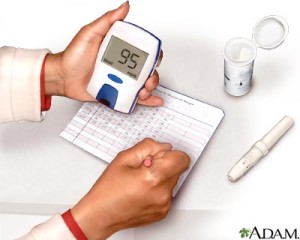 Self Monitoring: Take Charge of Your Diabetes
Self Monitoring: Take Charge of Your Diabetes
No one likes to stick himself with needles! But, if you have diabetes, you need to know your blood glucose levels to know if you are in good control. If your blood glucose levels are often high or low, it is time to talk with your health care team (doctor, dietitian, diabetes educator) to see what changes you need to make in medicines, eating or exercise.
How often should you check your blood glucose?
This all depends on how severe your diabetes is and what medicines you are taking.
If you are in good control (Hemoglobin A1C is below 7.0%), and are not on more than one diabetes medicine, your doctor may ask you to check BG just once or twice/week.
If your control is poor (Hemoglobin A1C is above 7.0%), or you require more than one diabetes medication, you will likely be asked to check BG at least once a day.
Insulin requires more attention:
If you are on insulin, you will need to check before each meal and at bedtime. Any time you are ill or in the hospital, you will need to check more often than usual. The stress of illness or infection increases blood glucose, and if you are vomiting, or have diarrhea you may have low blood glucose.
When should you check blood glucose?
If checking twice per week:
Fasting once each week, and 2 hours after the beginning of your evening meal once a week.
If checking daily:
Rotate between fasting and right before lunch and dinner and 2 hours after dinner.
If you are on insulin:
Check before each meal and at bedtime every day. You also need to check any time you are feeling like you may have low blood glucose (e.g. feeling dizzy, irritable, nauseas, extra hungry, sweaty).
Blood glucose goals: Your doctor or diabetes educator will give you specific goals for your blood glucose levels. The levels below are recommendations from The American College of Endocrinologists (ACE) and the American Diabetes Association (ADA)
Fasting and before meals: 80 to 110mg/dL (ACE); 80 to 130 mg/dL (ADA).
Two hours after the beginning of a meal: 80 to 140 mg/dL (ACE); 80 to 180 mg/dL (ADA

